
by Tara Bergman (USA) | Dec 16, 2015 | 2015, Advice, Celebrations, Cooking, Domesticity, Humor, Husband, Life, Memories, North America, Tara B., USA, World Motherhood
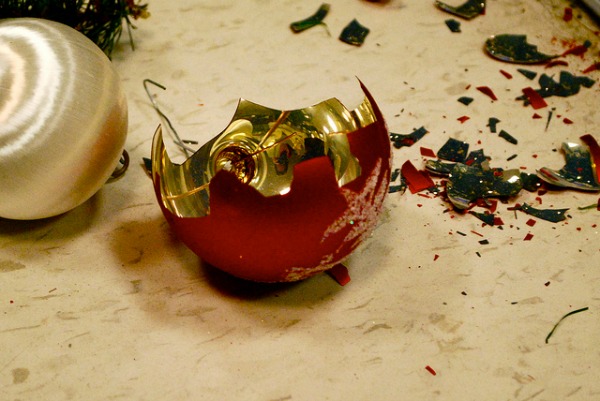
It’s the holiday season, a time of year when we flood social media with our best stories and photos while searching online for ideas to make the little touches around our home that much more memorable. We most often see people in heartwarming moments, because that is what we choose to share. But as we know, life is not only a collection of harmonious celebrations. Behind lovely family photos are often stories of angst. With each Pinterest success there are many hidden disasters.
Today, rather than dazzle you with my greatness, I am choosing to share some of my best holiday fails. My history with yuletide missteps extends back to my childhood when I sang “these eggshells are stale” at the top of my lungs at Mass because that was what I thought was being sung instead of “in excelsis deo.” Since then I have taken my share of festive stumbles, some figuratively (exploding cornbread) and some literally (down the steps with a cup of coffee and presents in hand). For the sake of brevity, I will share just a few. (more…)
Tara is a native Pennsylvanian who moved to the Seattle area in 1998 (sight unseen) with her husband to start their grand life adventure together. Despite the difficult fact that their family is a plane ride away, the couple fell in love with the Pacific Northwest and have put down roots. They have 2 super charged little boys and recently moved out of the Seattle suburbs further east into the country, trading in a Starbucks on every corner for coyotes in the backyard. Tara loves the outdoors (hiking, biking, camping). And, when her family isn't out in nature, they are hunkered down at home with friends, sharing a meal, playing games, and generally having fun. She loves being a stay-at-home mom and sharing her experiences on World Moms Network!
More Posts
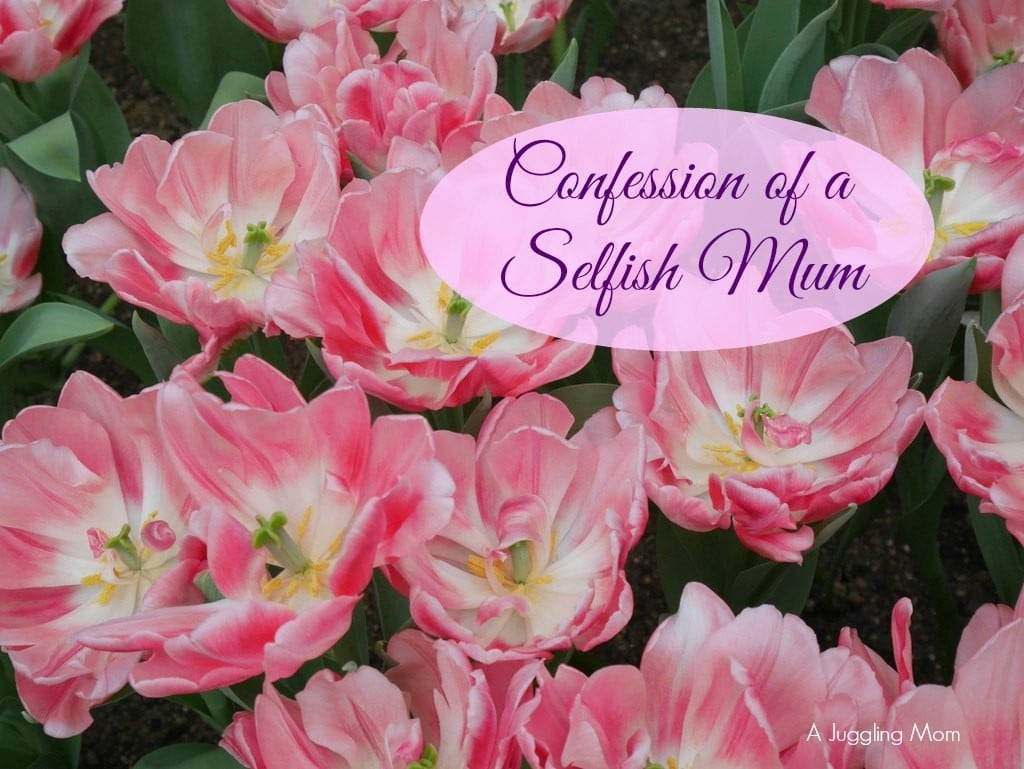
by Susan Koh | May 21, 2015 | 2015, Awareness, Being Thankful, Domesticity, Family, Friendship, Gratefulness, Happiness, Health, Holiday, Husband, Independence, Life Balance, Me-Time, Mental Health, Motherhood, Parent Care, Parenting, Relationships, Responsibility, Responsibility, Singapore, Stress, Susan Koh, Vacationing, World Motherhood
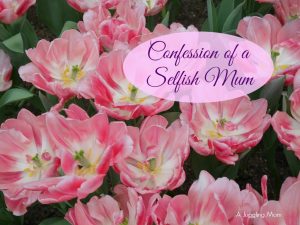 As mums, we are always seen as the one who should be self-sacrificing and present for our families. After all, we are the ones that our children turn to when they can’t go to bed, when they need a kiss on their boo boo or when they are back from school with a growling tummy that needs to be fed.
As mums, we are always seen as the one who should be self-sacrificing and present for our families. After all, we are the ones that our children turn to when they can’t go to bed, when they need a kiss on their boo boo or when they are back from school with a growling tummy that needs to be fed.
I’m not complaining about motherhood and there is nothing in the world I would trade it for. But some days, I feel so tired of playing mummy that I wish I could escape from all my mummy duties; and I’m pretty sure I’m not the only mum who feels this way.
And as you have it, I did get a little escapade when my group of girlfriends decided to head for a short weekend getaway to Thailand, sans husband and kids. Thankfully, my hubby was more than happy to step up and take care of my little one, giving them extra bonding time.
It turned out to be a weekend of shopping, eating and shopping some more; something that I hardly do with a little one who’s too inpatient to get out of the malls. And I could eat all the spicy food I wanted, which I usually avoid since I end up sharing most of my meals with my daughter. Nights were spent staying up late, chatting with friends and watching movies back in the hotel.
Did I miss my child? Of course, I did but you know what, it was refreshing to place myself first and not worry about my family during this break.
Sadly for mums, being selfish or putting ourselves first is regarded as a sin. And that’s why there are so many tired and depressed moms, who feel that they have no choice but to be dutiful and ignore their own needs.
Happy Mother = Happy Family
Never for a second did I think that I was a bad mom for going on that trip. I think that as moms, sometimes we need to choose ourselves over our families to ensure that we are recharged in order to go the distance and be a better spouse and better mother.
I love being a mom and while I’m far from being a perfect or super mom, I can say that I’m doing my best every single day.
My mantra has always been Happy Mother = Happy Family. And might I add for my hubby, Happy Wife= Happy Life.
So go ahead, take care of yourself. Pursue your personal happiness and take time to nourish yourself, body, mind and soul. Trust me, you’ll benefit from it and your children will too!
This is an original post to World Moms Blog from our “super mom” of one in Singapore, Susan Koh.
The image used in this post is credited to the author.
Susan is from Singapore. As a full-time working mom, she's still learning to perfect the art of juggling between career and family while leading a happy and fulfilled life. She can't get by a day without coffee and swears she's no bimbo even though she likes pink and Hello Kitty. She's loves to travel and blogs passionately about parenting, marriage and relationship and leading a healthy life at A Juggling Mom.
More Posts

by Melanie Oda (Japan) | Apr 17, 2015 | 2015, Awareness, Cooking, Cultural Differences, Culture, Domesticity, Expat Life, Eye on Culture, Family, Food, Health, Home, Identity, International, Japan, Life, Life Balance, Living Abroad, Maternal Health, Me-Time, Motherhood, Multicultural, SAHM, Social Equality, Stress, Time, Traditions, Womanhood, World Motherhood
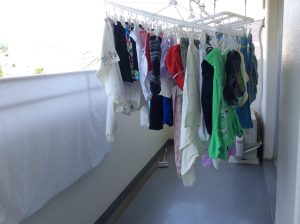 I start my morning here in Japan the same way every day: by cleaning out the drain trap.
I start my morning here in Japan the same way every day: by cleaning out the drain trap.
Not very pretty, I suppose, but I’ve learned the hard way that it needs to be done frequently and well. The drain traps here in Japan are metal mesh to prevent food from going down the drain. They get gross very quickly.
I’m pretty sure I started out my days when I lived in the US with a cup of coffee, which seems quite glamorous by comparison!
In spite of our gains in education or employment opportunities over the last century, much of our time as women gets taken up by mundane household tasks like this. Women all around the world are doing the same kind of things: laundry, food preparation, cleaning, child care, though in very different ways.
It makes me curious. How much of your time gets spent on “daily chores?” What kinds of things do you need to do every day? Do you do them alone, or do you have help?
Perhaps it is a boring topic, but for comparison I thought I would share a little bit of what housework is like here in Japan.
Laundry gets done daily in most families. We have washing machines, but most people don’t have dryers. In a country with cold winters, humid summers, and a rainy season, keeping up with the laundry feels like a daily battle! When the weather is not cooperative, laundry gets hung from curtain rails or any other overhang that can be found indoors. We have to bob and weave our way around the house. Imagine that Catherine Zeta Jones movie, but with laundry instead of lasers.
I do the shopping most days as well. This is quite common here in the greater Tokyo area, where storage space is limited and many people do not have cars to allow buying in bulk. Milk is sold by the liter; laundry detergent in 500ml bottles. The biggest shopping challenge is buying rice, which comes in 5 or 10kg bags.
I need to dust and vacuum every day. This is much more often than we did in the US growing up. I’m not sure why Japan is so dusty. Could it be the tatami floors? The single pane windows? The small living space? And more important than why, how can I make this dust accumulation stop?
Japanese cuisine seems to be gaining in popularity around the world. Many Japanese people eat a full meal in the morning (though this is slowly changing,) as well as at lunch and dinner. Japanese bento are also getting a lot of attention on the Internet for being nutritious as well as visually appealing. Overwhelmingly, the cooking is done by women. (Personally, since my children’s lunch is provided by the school, most days I cook twice.)
Like most families here, we have a gas stove-top, a rice cooker, and a microwave combined with an electric oven for cooking. My mother-in-law has a separate gas burner that can be placed on the table for doing things like sukiyaki or okonomiyaki, foods that are consumed as soon as they are cooked by the family from the same dish. My children are still a bit too small for me to attempt this at home.
I think many of us around the world are doing these same things, but the nitty-gritty of how we get it done and how often we do it are different. I can’t help but wonder what housework says about the values of the culture.
In the US, for example, many families take pride in a well-decorated home. In Japan that is much less important. (Perhaps because many women are spending all that time dusting and dodging laundry….)
What kinds of things are included in your daily duties? How do you feel about doing them?
This is an original post to World Moms Blog from our writer in Japan and mother of two, Melanie Oda.
The image used in this post is attributed to the author.
If you ask Melanie Oda where she is from, she will answer "Georgia." (Unless you ask her in Japanese. Then she will say "America.") It sounds nice, and it's a one-word answer, which is what most people expect. The truth is more complex. She moved around several small towns in the south growing up. Such is life when your father is a Southern Baptist preacher of the hellfire and brimstone variety.
She came to Japan in 2000 as an assistant language teacher, and has never managed to leave. She currently resides in Yokohama, on the outskirts of Tokyo (but please don't tell anyone she described it that way! Citizens of Yokohama have a lot of pride). No one is more surprised to find her here, married to a Japanese man and with two bilingual children (aged four and seven), than herself. And possibly her mother.
You can read more about her misadventures in Asia on her blog, HamakkoMommy.
More Posts

by Dee Harlow (Laos) | Jan 14, 2015 | Africa, Domesticity, Expat Life, Family Travel, Global Citizenship, Inspirational, Lesotho, Moving, Relocating, South Africa, Uncategorized
 In 2002, my international investment banking career in Singapore had left me drained. I needed to find the physical and mental freedom to return to my first passion, which was development work. I left my job and embarked on a solo backpacking journey, looking for peace and inspiration. By the time I circled around sub-Saharan Africa and ended in Lesotho, I found both. I have never looked back.
In 2002, my international investment banking career in Singapore had left me drained. I needed to find the physical and mental freedom to return to my first passion, which was development work. I left my job and embarked on a solo backpacking journey, looking for peace and inspiration. By the time I circled around sub-Saharan Africa and ended in Lesotho, I found both. I have never looked back.
My very first impression of Lesotho came from the high peaks of the Drakensberg mountain range in the eastern part of the country, where the autumn air was cool and crisp. Dirt roads wound through small villages dotted with tradition rondavels made of stones or mud, with thick thatched roofs. The vast mountain plains opened up into a broad blue sky and brilliant, high-altitude sunshine. Our hiking trail climbed up rocky table mountain tops and down into freezing cold streams that cut through house-sized boulders, groves of thirsty willows, and into caves of prehistoric paintings. Lesotho, tucked completely within the walls of South Africa, seemed an ideal natural treasure to me.
Fast forward thirteen years. After living in Vientiane, Laos, for two years, last November, I arrived back in Lesotho. This time, I had a family in tow. My husband is in the U.S. Foreign Service. The rhythm of our family life consists of an international move every two to three years, with trips back to the States for home visits and language training in between.
Where I once turned to travel to help me change my life, what I now seek at each new destination is stability and conetinuity for my family.
After 22 hours of travel, we arrived in the capital city of Maseru, which is situated in the hilly western lowlands. The air is again cool and crisp, although now it is springtime. The backyard of our new house is full of bright yellow birds, endlessly flitting back and forth to complete their work. The males are busy constructing round grassy nests, which dangle festively in our trees. If a female doesn’t accept the nest, the male bird tears the entire thing apart and starts all over again. The kids and I have named one “Butternut”, and we admire his tireless work everyday.
Maseru is a small city with a growing suburban sprawl. There are barely 300,000 people in the entire urban area. The buildings are low, the traffic flows, and only a couple of noteworthy malls have popped up within the past two years. “First impressions” this time around are mainly focused on the business of getting on with life for our family–new school, new friends, new job, new supermarkets, getting the internet set up, figuring out a car, and obtaining household help. Luckily, it’s been quite easy to get everything that we need. As far as Western-style life needs go, there are plenty of products here that are brought in from South Africa and beyond.
With our basic needs met, we’ve been exploring beyond the city. I still find Mother Nature calling at every turn. Within Lesotho, you can go hiking just about anywhere. Cross a bridge and stop to hike down to explore up the river. Head up a hill to find herdsmen tending livestock. When it rains, we hike in the mud (the kids’ favorite). When it’s hot, we cool down in streams and waterfalls. The nearby children find us no matter where we go; the adults are not engaging but very courteous. Fortunately, the personal safety issues prevalent in most of South Africa are not as concerning in Lesotho yet, and most of the expats we’ve met are comfortable exploring the countryside.
After the scant two-and-a-half months that we’ve been here, we are already feeling more settled. And while we all miss what we’ve left behind in our “old” life in Laos . . . and Mexico. . . and the U.S. . . ., we begin anew to embrace what we have and to anticipate what gifts our new country holds.
Is there a change in your life that you’ve made or would like to make? What have you left or would like to leave behind, and what have you found or hope to find?
This is an original post to World Moms Blog by our mother of twins writer, Dee Harlow, currently living in Lesotho. You can also find her on her blog Wanderlustress.
Photo credit attributed to Damien du Toit. This photo has a Flickr Creative Commons Attribution-Non-Commercial-ShareAlike license.
One of Dee’s earliest memories was flying on a trans-Pacific flight from her birthplace in Bangkok, Thailand, to the United States when she was six years old. Ever since then, it has always felt natural for her to criss-cross the globe. So after growing up in the northeast of the US, her life, her work and her curiosity have taken her to over 32 countries. And it was in the 30th country while serving in the Peace Corps in Uzbekistan that she met her husband. Together they embarked on a career in international humanitarian aid working in refugee camps in Darfur, Sudan, and the tsunami torn coast of Aceh, Indonesia.
Dee is now a full-time mother of three-year old twins and continues to criss-cross the globe every two years with her husband who is in the US Foreign Service. They currently live in Vientiane, Laos, and are loving it! You can read about their adventures at Wanderlustress.
More Posts

by Melanie Oda (Japan) | Jan 8, 2015 | 2014, Awareness, Child Care, Childhood, Culture, Domesticity, Education, Expat Life, Eye on Culture, Family, Feminism, Grandparent, Home, Husband, International, Japan, Life, Life Lesson, Living Abroad, Marriage, Me-Time, Motherhood, Multicultural, Parent Care, Parenting, Priorities, Relationships, Responsibility, School, Social Equality, Womanhood, Women's Rights, World Motherhood, Younger Children
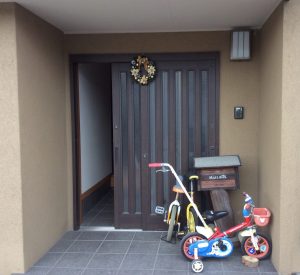 Gender equality has been in the news quite a bit in Japan recently, sort of, and some things have happened closer to home that have me thinking.
Gender equality has been in the news quite a bit in Japan recently, sort of, and some things have happened closer to home that have me thinking.
It started when a (female) Tokyo assembly member was heckled in a sexist way. Then Prime Minister Abe introduced some new policies to let women “shine.” (He needs to get them doing something for the economy.) He even appointed several women to cabinet posts, for about five minutes, until they were slapped back down into their places over minor scandals.
In Japan, people are talking more about issues women face but no one seems to be doing much about them.
(Lest I forget: strangely enough, the declining birth rate is treated as a “women’s issue.” I seem to remember my husband being involved, too.)
I never considered myself a feminist growing up. Some members of the evangelical, conservative community I grew up in doubtless felt “feminist” was a new version of the “F-word.”
OK, so I went to a high school with more sports options for boys than girls. And yes, girls were encouraged to take chorus and home economics instead of woodworking or mechanics. So maybe I heard men from my community refer to grown women as “broads” or “gals.” There also were some restrictions at church regarding women’s and men’s roles. But I never felt that possessing certain types of baby-making parts limited my potential.
Then I moved to Japan, where gender roles are more firmly entrenched and my way of thinking slowly changed.
As I get older, and because I am a mother, I find that I am limited in ways that I couldn’t have foreseen as a young girl.
Some people may find life here in Japan freeing. If you aspire to be a homemaker a la Martha Stewart, then your life’s work would be very much respected and appreciated here. My husband wouldn’t bat an eyelid if he came home to a messy house because I’d spent the day at a preschool mothers’ lunch. He knows that is part of the job (on the other hand, it would never occur to him to pick up the mess himself.)
If, as a woman, you have other aspirations, Japanese culture seems designed to work against you. The glass ceiling is very much in tact. On the news here you do hear issues like lack of childcare and “maternity harassment” being addressed. But what gets talked about less often is that to many women, including myself, it feels as if there’s a glass door as well.
It’s my front door.
Before a woman can even think about what is facing her out in the world, she needs to address the forces that are keeping her at home. Some of these are practical, some are logistical, some are cultural and perhaps peculiar to Japan and it’s work culture.
For me, it starts with my husband: He leaves home at 7am every morning, but I have no idea what time he will be back. Sometimes it’s 7pm. Sometimes it’s midnight. He may be in the office that day, or he may suddenly be sent to another prefecture. He’s made international trips on 12 hours notice. I cannot depend on him being home at a designated time, by no fault of his own. The idea of him taking time off with a sick child is preposterous in the extreme.
I have been lucky enough to have two job offers recently, both of which would be more or less during school hours, but neither is nearby. If a child were to get sick and need picking up, or if god-forbid there was a natural disaster (which is always in the back of your mind if you are a mother in Japan,) then my husband would be closer. I mentioned that, and he completely shot me down. Not just the idea of him picking up the kids in case of an emergency, but the idea of a job anywhere outside of cycling distance from the school.
We live in a residential neighborhood. I patch together some part-time work here and there, but it’s not like there are loads of professional opportunities in a two kilometer radius.
I suddenly felt very limited, penned in, in a way I haven’t felt before. The glass door was slamming in my face.
I don’t think I’m alone in this conundrum. Go to almost any supermarket in a residential area during the day, and you will see women in their prime working years manning the register. Many of these women have university degrees. Many have licenses and qualifications to be doing other kinds of work, but they want to stay close to home. They also need salaries to stay under $10,000 year or face a peculiar Japanese tax code and insurance system that penalizes families where both partners have incomes over that amount.
Then there are my kids: Like 2/3 of Japanese women with children under 6, I stayed home when they were small. They now completely depend on me for everything. It seems to have never entered their minds that someone else could give them a bath or help them find their missing socks, mostly because no one else has ever done anything for them. Especially when they are sick, they want only me. It was very hard when my daughter was in the hospital, both children wanting to be with me and emphatic that no one else would do.
But now my youngest is in elementary school, and I would like to just be doing more of something….else, but for me to plunge into the workforce would be a huge adjustment for my children. Is it worth the stress? Can we survive what is sure to be a painful adjustment period?
Maybe if I had more family support, it would feel less impossible but as it is, it seems like everyone is against me.
Which brings me to the final characters in this comedy, my in-laws: They say they’ll watch the kids, then they change their minds. Or something better comes up. From their point of view, this house and these people are completely my responsibility. Anything they do is extra credit.
To be honest, we’re getting to the point where my in-laws need my help more than I need theirs.
They aren’t shy about letting me know my place.
One day not too long ago, my son was playing at the park with his friends. It was getting close to homework time, so I called him and told him to come home. He said he was playing with Jiji (which is an endearing term for grandfather used in our region of Japan,) and could he play for a bit longer? Since he was out with an adult, I said okay.
The next day, I got a verbal whipping from my father-in-law over the phone, accusing me of being irresponsible, a bad mother. It took me a few minutes to understand why he was saying this, but when I got to the bottom of it, I realized my son had lied to me. He was playing with his friends when Jiji walked by and told him to go home. My son told him I wasn’t at home and said he couldn’t come back until I did. (I must have called right at this point.) “How dare you not be home in the afternoon?” said Jiji.
Putting aside that none of this nonsense was true, so what if I wasn’t home in the afternoon? Of course I wouldn’t have left the kids to wander the neighborhood like stray dogs, but why was my not physically being inside my house such an issue to him? His assumption that it was my duty to be always available to everyone took me by surprise.
I could almost hear the glass door slamming again.
There are also other barriers for women in Japan—an over active PTA for one, and a myriad of community responsibilities attended to exclusively by women for another. I imagine most women in the world encounter both the “glass door” and the “glass ceiling” in some form or another, but in Japan only one of these factors is seems to be getting much attention. Building new daycare facilities isn’t enough; the government stating goals to increase women’s participation in the workforce isn’t enough. Until we do something about that glass door, nothing will change for one of the best educated, least utilized group of women in the world.
Do you feel you are fulfilling your potential, both at work and at home? What’s the situation like in your country?
This is an original post for World Moms Blog from our writer and mother of two in Japan, Melanie Oda.
If you ask Melanie Oda where she is from, she will answer "Georgia." (Unless you ask her in Japanese. Then she will say "America.") It sounds nice, and it's a one-word answer, which is what most people expect. The truth is more complex. She moved around several small towns in the south growing up. Such is life when your father is a Southern Baptist preacher of the hellfire and brimstone variety.
She came to Japan in 2000 as an assistant language teacher, and has never managed to leave. She currently resides in Yokohama, on the outskirts of Tokyo (but please don't tell anyone she described it that way! Citizens of Yokohama have a lot of pride). No one is more surprised to find her here, married to a Japanese man and with two bilingual children (aged four and seven), than herself. And possibly her mother.
You can read more about her misadventures in Asia on her blog, HamakkoMommy.
More Posts

by Shaula Bellour (Indonesia) | Dec 4, 2014 | 2014, Awareness, Being Thankful, Cultural Differences, Domesticity, Expat Life, Family, Home, Husband, Indonesia, International, Kids, Life, Life Balance, Life Lesson, Living Abroad, Motherhood, Parenting, Responsibility, Shaula Bellour, Twins, World Motherhood
 This month marks our third anniversary of living in Jakarta. Considering how empty our house was when we first arrived here, I am staggered at how much stuff we have acquired in that short time.
This month marks our third anniversary of living in Jakarta. Considering how empty our house was when we first arrived here, I am staggered at how much stuff we have acquired in that short time.
We initially started out with garden chairs as living room furniture and took our time furnishing our new space. Though the house isn’t exactly cluttered, it feels full – and I feel daunted by the sheer volume of STUFF that seems to fill every closet and drawer.
It’s the never-ending tide of cheap party favors, orphaned toy and game parts, and plastic galore. It’s the piles of paper: children’s artwork, old receipts, and unfinished magazines. It’s all the things I never use or wear, the boxed objects I might use one day and the stock of (US-bought) items I think I can’t live without.
Moving from the US to East Timor 5 years ago was a great opportunity to clear things out and scale back. Although I did feel a little sad watching an expectant dad cart away our twins’ disassembled cribs the night before we moved, it felt good to sort through our accumulated belongings and assign categories: donate, sell, ship or store.
Donating unwanted items was easy. I arranged for a pick up with a local charity group, stacked everything on my porch and it was all magically whisked away. We sold our car and other big items, sent friends home with plants and other housewares and shipped our edited possessions to Dili.
Everything else went into our storage unit. A few years later I visited it for the first time and was amazed by what we’d deemed worth keeping at the time. I randomly peeked in a few boxes and found…sweaters. Lots of sweaters. What was I thinking? It was winter at the time and we didn’t know how long we’d be away, but still.
We also stored our furniture, though we recently realized that the cost of storing it for the last five years has probably exceeded its value. While visiting the US, my husband spent a day digging out furniture and giving it all away – couches, tables, lamps, washer/dryer…everything. I was thousands of miles away at the time but it felt fantastic.
Leaving East Timor prompted a similar purge. And yet here I am again, feeling the urgent need to reduce and simplify.
Here in Jakarta, this process isn’t as straightforward. While it’s fair to say that nothing will ever go unused, getting rid of unwanted items isn’t as simple as piling them on the porch. I frequently give outgrown kids’ clothes and shoes to friends or neighbors, donate household items to women’s association charity shops, or leave things out to be upcycled by our handcart-pulling bin man.
Last month my children got involved and we went through their toys, books and clothes and filled 10 bags with donations for a local orphanage. Though it was good for them to be part of this process, I would also really like for them to see where their donations are going and consider giving back in other ways (time, money, materials etc.).
Although I will never be a minimalist (or a light packer…), I’m committed to scaling back and am hopeful that this is a first step toward living with less.
A quick internet search reveals hundreds of creative ways to de-clutter, organize and simplify our homes – and ultimately our lives. We are told that having too much stuff is draining and overwhelming us, that we are wasting too much time and money managing our things and that getting rid of all this stuff can make our lives richer and happier.
All of this may be true, but for me the bigger question is about how to acquire less stuff in the first place.
Clearly I don’t have the answer yet, but it’s definitely something I would like to explore and practice – starting now.
Please share your strategies and tips to get me started!
How do you minimize/manage the “stuff” in your house and life? Do you have any tips for living with less?
This is an original post for World Moms Blog by Shaula Bellour.
Shaula Bellour grew up in Redmond, Washington. She now lives in Jakarta, Indonesia with her British husband and 9-year old boy/girl twins. She has degrees in International Relations and Gender and Development and works as a consultant for the UN and non-governmental organizations.
Shaula has lived and worked in the US, France, England, Kenya, Eritrea, Kosovo, Lebanon and Timor-Leste. She began writing for World Moms Network in 2010. She plans to eventually find her way back to the Pacific Northwest one day, but until then she’s enjoying living in the big wide world with her family.
More Posts
















